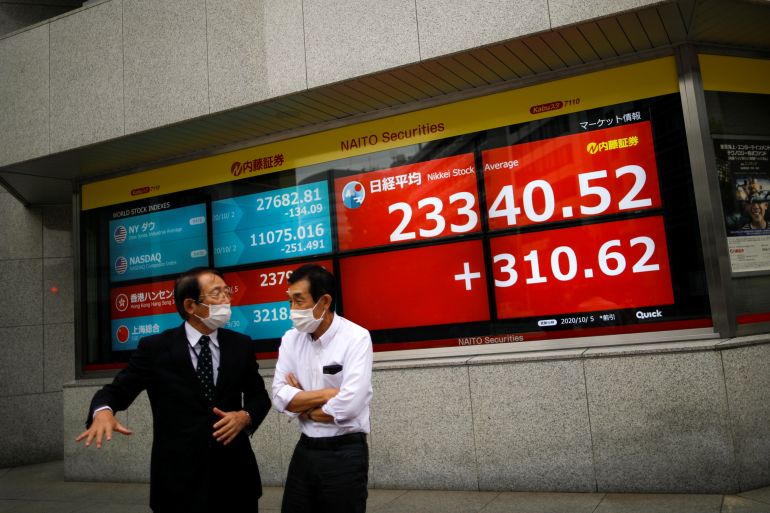Stocks recover losses despite Trump’s shock stimulus cancellation
Asian shares opened lower but rebounded on optimism that the US is likely to pass new stimulus measures.

European shares rose on Wednesday, as initial dismay at US President Donald Trump’s decision to cancel fiscal stimulus negotiations with policymakers in Washington was replaced by optimism about an aid package after the US elections.
Trump broke off talks with rival Democrats in a tweet, saying that negotiations will stop until after the November 3 election, when he promised a major stimulus bill if he wins.
Keep reading
list of 4 itemsAs US inflation ticks back up, it could impact the presidential election
Will the US unemployment rate continue at historic lows?
The UK’s new minimum wage ‘badly needed’ but many calling for more
The news quickly rattled Wall Street but Asian investors became less concerned on the grounds that whoever wins the election will still introduce a fiscal stimulus bill.
Asian stocks hit two-week highs and European shares, which opened slightly in the red, quickly rose, helped by upbeat earnings reports.
The Europe-wide STOXX 600 stock index was up 0.2 percent in early trade and London’s FTSE 100 was 0.1 percent higher.
The MSCI world equity index, which tracks shares in 49 countries and had climbed to a three-week high before the stimulus talks were cancelled, was up 0.1 percent.
US stocks were also set to rebound when Wall Street opens, with S&P 500 futures 0.6 higher and Nasdaq futures up 0.5 percent, helped by further tweets by Trump where he called for more fiscal support.
![Nasdaq futures chart [Bloomberg]](/wp-content/uploads/2020/10/365132062.jpg?w=770&resize=770%2C433)
“Even if a pre-election deal cannot be reached, Biden’s widening lead in the election polls is making it likelier that more substantial stimulus can eventually be agreed on,” UBS strategists wrote in a note to clients.
“Indications of a more decisive election result may also reduce investors’ concerns about a protracted and contested outcome,” they added.
A poll on Monday showed Democrat Joe Biden with his widest lead in a month, as a majority of Americans said Trump could have avoided catching the coronavirus.
Deutsche Bank strategists also wrote that markets were instead focusing on the prospect of more fiscal stimulus in the case of a Democratic clean sweep.
“Further evidence that this election will result in a definitive result will offset any short term stimulus disappointment,” wrote Deutsche Bank strategist Jim Reid.
‘No bad market outcomes’
Dutch bank ING’s Asia Pacific head of research, Robert Carnell, said: “There are probably no bad market outcomes except for a contested result.”
“That comes back into play if Biden’s lead starts to narrow, say below 7 percentage points, where the margin for polling error leaves the outcome less clear,” Carnell said in a research note sent to Al Jazeera.
Real Clear Politics’ latest average of 13 opinion polls suggests Biden is 9 percentage points ahead of Trump nationally, the widest margin since July. In key battleground states, Biden’s lead stands at 4.4 percentage points, his best showing since August.
Trump’s tweets came shortly after US Federal Reserve Chair Jerome Powell reiterated warnings about the economic recovery, saying that the US economy could slip into a downward spiral if the coronavirus is not controlled and growth sustained.
German industrial output fell unexpectedly in August, indicating that the recovery from the coronavirus recession in Europe’s largest economy could be less powerful than hoped.
The dollar – which initially rose when the talks in Washington, DC were cancelled – fell as European markets opened on Wednesday, down 0.1 percent against a basket of currencies at 93.705.
Minutes from the Fed’s September meeting will be published at 18:00 GMT.
The euro was up 0.2 percent at $1.1756, while the Australian dollar, a proxy for relatively risky assets, was up 0.5 percent against the US dollar.
The Australian government pledged billions of dollars in tax cuts and measures to boost jobs on Tuesday, but traders say the Australian currency faces the risk of falling as the Reserve Bank of Australia is expected to cut rates in November.
The British pound was up 0.4 percent at $1.2919.
Brussels is gearing up to extend Brexit negotiations until at least mid-November to avoid the UK exiting the bloc without a trade deal when a transition period with the European Union ends on December 31, sources said.
Oil prices extended their decline, with West Texas Intermediate crude oil futures down 48 cents at $40.18 per barrel.